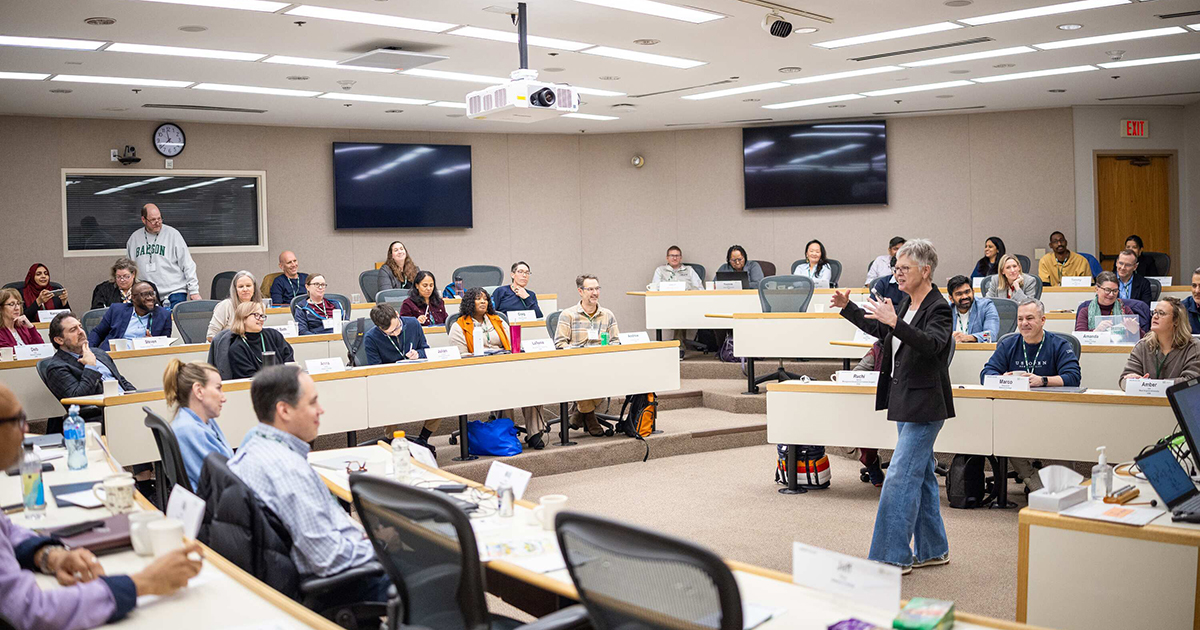These 3 Trends Will Change What It Means to Be an Entrepreneur in 2025

The most recent data from the new Global Entrepreneurship Monitor report reveals a powerful trend for the future of entrepreneurship.
Young adults, aged 18-24, had both the highest entrepreneurial activity and entrepreneurial intentions in the United States, according to the Global Entrepreneurship Monitor 2023-2024 United States Report. With similar results in 2022, this is not just a minor shift—it’s a fundamental change that could have lasting impacts on the economy and society.
Editor’s note: This article first appeared in Entrepreneur magazine.
I serve as the chair of the board for the Global Entrepreneurship Research Association, the entity that oversees GEM, which was founded in 1999 as a joint venture of Babson College and the London Business School. As the GEM U.S. team co-leader and a professor of entrepreneurship at Babson, I see firsthand the impact of the research created by the Global Entrepreneurship Monitor.
Here are three entrepreneurship trends from the new GEM report that are changing the landscape for the future.
1. Young Entrepreneurs on the Rise
For years, entrepreneurship has been dominated by older, more experienced individuals, but this year’s report shows that the youngest adults are now at the forefront. According to GEM, 24% of 18- to 24-year-olds are engaged in some form of entrepreneurial activity, a higher rate than any other age group. What’s driving these young entrepreneurs is equally remarkable: They aren’t just starting businesses to make money; many are deeply committed to making a positive impact on society and the environment.
These young entrepreneurs make sustainability a key priority. They are more likely than entrepreneurs from older generations to build businesses with sustainability as a core focus—whether that means reducing their environmental footprint or focusing on social causes. This shift toward impact-driven entrepreneurship isn’t just anecdotal. GEM data shows a significant number of young entrepreneurs taking real, measurable steps to create businesses that align with their values. With sustainability as their north star, young entrepreneurs appear to be simultaneously pursuing societal impact as well as profits.
However, it’s not all smooth sailing. While young people are leading the way in starting businesses, they are also discontinuing them at higher rates than their older counterparts. The discontinuation rate for 18- to 24-year-olds is 15%, the highest among all age groups. This is not surprising, given the challenges of inexperience and more limited access to capital. Starting a business is tough, and sustaining one is even more challenging. But despite these hurdles, the enthusiasm and energy that young people bring to entrepreneurship are undeniable, and with the right support, this generation has the potential to drive substantial change.
2. Tech Gender Gap Narrows
One of the most promising findings in the GEM report is the narrowing gender gap in the technology sector. Historically, tech startups have been dominated by men, but 2023 saw a record-low difference in the number of men and women starting tech companies. The gap has narrowed to just 1%, with 8% of women compared with 9% of men launching businesses in the Information and Communication Technology (ICT) sector.
This is a significant step forward and reflects broader efforts to support more women technology startups. Still, it’s important to recognize that while progress is being made, continued focus on providing equal opportunities is essential to ensuring this trend continues.
3. Optimistic Outlook for Black and Hispanic Entrepreneurs
Another highlight from the report is the optimistic outlook among Black and Hispanic entrepreneurs. These groups showed stronger confidence in their entrepreneurial abilities and lower fear of failure compared to their white counterparts. Black respondents, in particular, demonstrated high levels of resilience and self-assurance, which is vital in overcoming barriers faced in starting and sustaining businesses. This optimism is encouraging, but there’s still much work to be done in assuring ecosystems offer equal opportunities for all aspiring entrepreneurs, regardless of their background.
A Promising Future
Reflecting on the key findings of this year’s GEM report, it’s clear that the entrepreneurial landscape is changing in meaningful ways. The rise of young, sustainability-driven entrepreneurs signals a future where business is not only about profit but also about making a difference. These young entrepreneurs are launching businesses at a time when the world is looking for solutions to some of its most pressing challenges—climate change, poverty and economic recovery.
Yet, to fully realize the potential of this next generation, there must be more focus on addressing the challenges they encounter. Young entrepreneurs need access to the right resources—whether it’s funding, education or mentorship—to turn their innovative ideas into sustainable businesses. The narrowing gender gap in tech is encouraging, but we must continue to foster environments that support women and other underrepresented groups in entrepreneurship.
The GEM report paints a picture of an entrepreneurial future driven by purpose, diversity and innovation. But it also reminds us of the work that lies ahead in making entrepreneurship more accessible and sustainable. If we can provide young entrepreneurs with the tools and support they need, we will not only see more businesses being created—we’ll see businesses that are making a lasting, positive impact on the world.
Dr. Jeffrey P. Shay is a professor of entrepreneurship at Babson College. He is chair of the board for the Global Entrepreneurship Research Association (the entity that oversees the Global Entrepreneurship Monitor) and co-leader of GEM USA.
Posted in Insights



